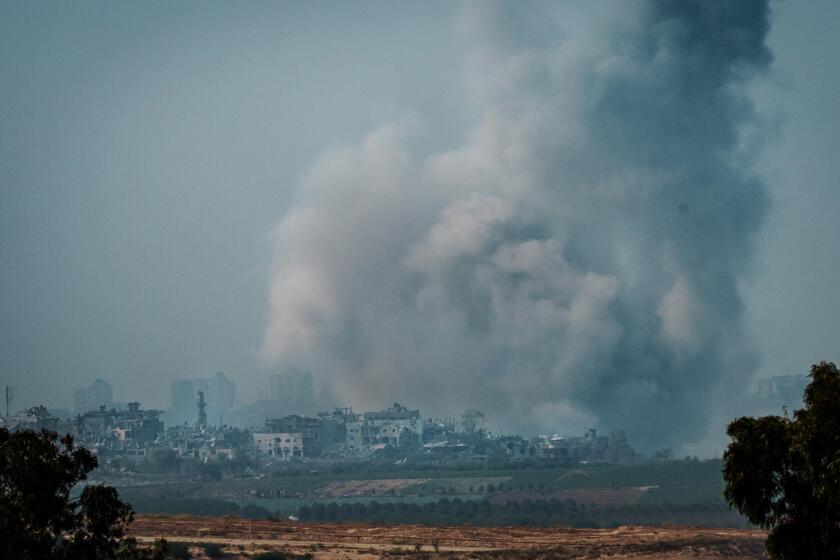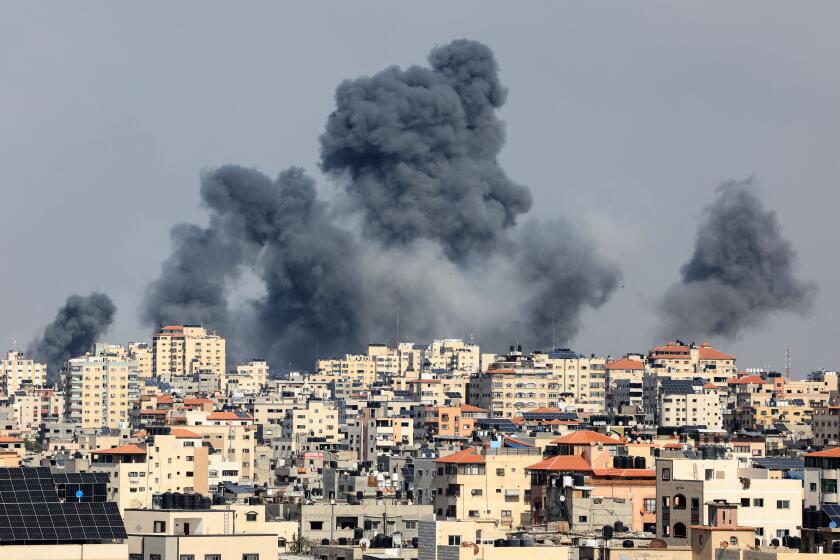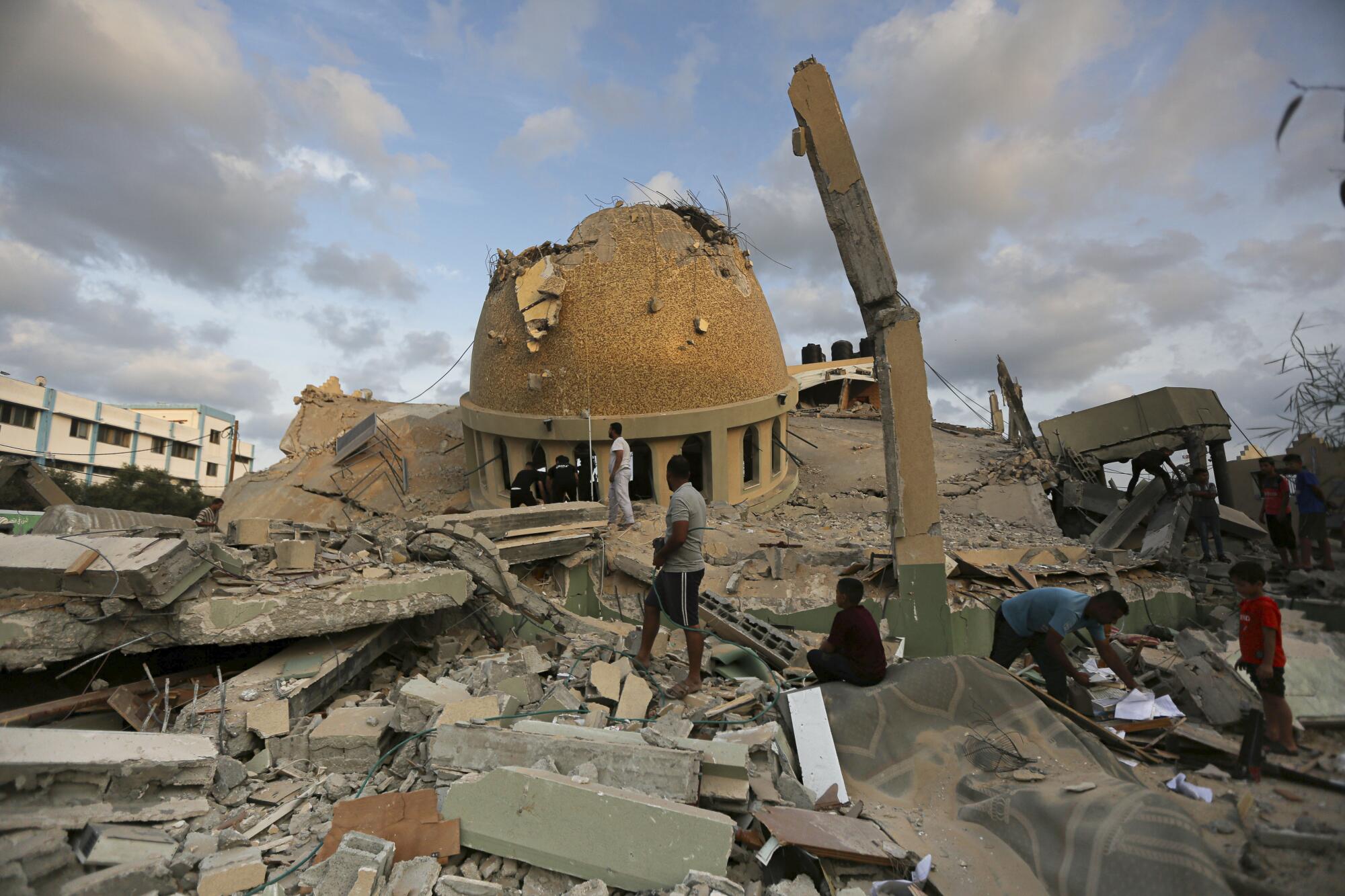
- Share via
AMMAN, Jordan — With at least 700 people reported dead in Hamas terrorist and rocket attacks, and more than 400 Gazans reported killed in Israeli counterattacks, Prime Minister Benjamin Netanyahu warned Sunday of a protracted conflict as Israel reacts to the bloodiest attack on its own soil in 50 years.
Israel pressed its bombing campaign on Gaza on Sunday, firing a relentless barrage on the coastal strip and formally declaring war as Gaza’s Hamas rulers said their fighters continued to battle Israeli forces inside Israel.
Israeli citizens were reeling from the unprecedented scale of the mayhem, in which militants slaughtered more than 200 youths at a musical festival and kidnapped elderly people and entire families. The violence shattered the relative comfort that many Israelis have enjoyed for years.
The Biden administration and other Western powers struggled to find a resolution that would stanch the bloodshed, amid concerns of the possibility of a wider regional conflagration after Hezbollah, the Lebanese Shiite militant group and political party, said in a statement Sunday that it had launched artillery and guided rockets on three posts on the Israeli-occupied Shebaa Farms in southern Lebanon “in solidarity” with the Palestinian people. The attacks were intended to “liberate what remains of our occupied land,” Hezbollah said, adding that an Israeli drone destroyed a Hezbollah tent in the area.
Israeli forces said in a statement on the messaging app Telegram that their retaliatory bombing campaign had hit 10 Hamas targets in multistory buildings in Gaza, including the group’s intelligence headquarters and a military compound, as well as a weapons production site and an arms storage area belonging to the Islamic Jihad militant group.

Israel said it brought in special forces to try to wrest control of four sites from Hamas fighters, including two kibbutzim that militants entered earlier in their attacks.
The fighting came on the second day of hostilities between Israel and Hamas, which launched a stunning cross-border incursion Saturday that caught Israel off guard and had its forces scrambling to beat back attackers on multiple fronts. As many as 1,000 Hamas fighters were involved in the assault, U.S. Secretary of State Antony J. Blinken said on ABC’s “This Week” — a high figure that underscored the extent of planning by the militant group.
Netanyahu grimly told his compatriots that their country was “at war” and on Sunday, Israel’s Security Cabinet issued a formal declaration.
The sudden war in Israel and Gaza upends political calculations as violence hits a scale not seen in decades.
Israeli media cited the country’s rescue services as saying that at least 700 Israelis had been killed, including 44 soldiers, along with some 2,000 wounded. Health officials in Gaza said Sunday that 413 people in the enclave had died, with 2,000 others wounded.
More than 100 Israelis had been kidnapped and were being held in Gaza, according to the Israeli Government Press Office, which as yet has not given an exact figure. The situation will greatly complicate Israel’s strategy during and after the fighting.
Hamas and the smaller Islamic Jihad group on Sunday claimed to have taken captive more than 130 people from inside Israel and brought them into Gaza, saying they would be traded for the release of thousands of Palestinians imprisoned by Israel.
Abu Ubaida, military spokesman for the Qassam Brigades, Hamas’ military wing, taunted Netanyahu in a statement Sunday, saying Israeli forces “fell like grasshoppers by the hundreds.”
“Threatening Gaza and its resistance and its people is a losing game and a broken record,” Ubaida said.
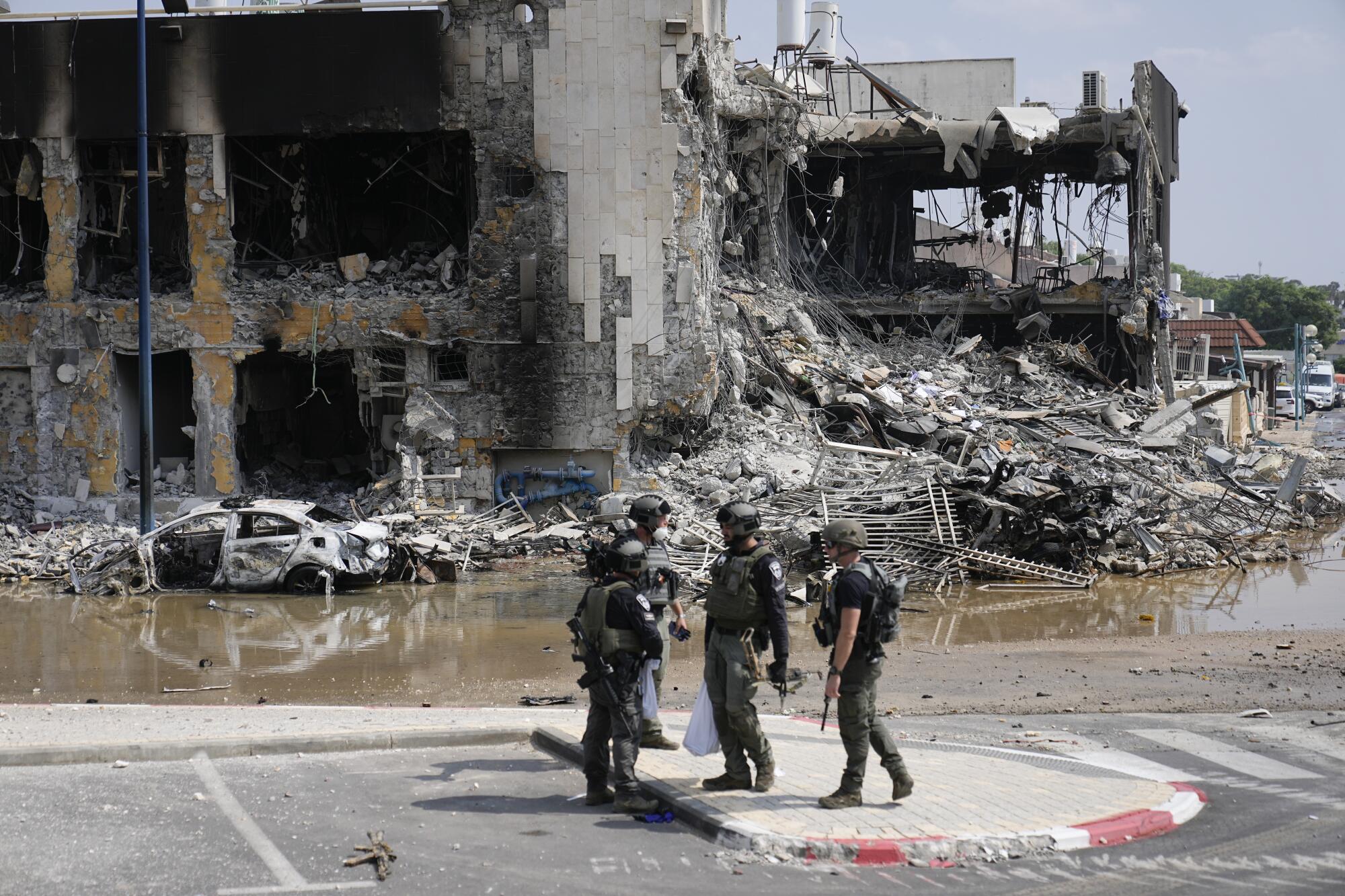
In Lebanon, United Nations peacekeeping forces in the south, known as UNIFIL, said that they remained in position and were in contact with both Israel and Hezbollah “to contain the situation and avoid a more serious escalation.”
“We urge everyone to exercise restraint and make use of UNIFIL’s liaison and coordination mechanisms to de-escalate to prevent a fast deterioration of the security situation,” the group said.
The Lebanese army said Sunday that it had deployed near the border with Israel, was running patrols and was “closely coordinating” with U.N. forces.
The Israeli military said in a statement on Saturday night that it was preparing a coordinated offensive in Gaza using air, ground and naval forces.
Hamas gunmen rampaged for hours Saturday, gunning down civilians and snatching people in towns, along highways and at a techno music festival attended by thousands in the desert near Gaza. The rescue service Zaka said it removed about 260 bodies from the festival, and the toll was expected to rise. It was not clear how many were already included in Israel’s overall toll.
In central Israel, a line of Israelis snaked outside a police station to supply DNA samples and other means that could help identify missing family members.
Mayyan Zin, a divorced mother of two, said she learned that her two daughters had been abducted when a relative sent her photos from a Telegram group showing them sitting on mattresses in captivity. She then found online videos of a chilling scene in her ex-husband’s home in the town of Nahal Oz: Gunmen who had broken in speak to him, his leg bleeding, in the living room near the two terrified, weeping daughters, Dafna, 15, and Ella, 8. Another video showed the father being taken across the border into Gaza.
In Gaza, whose electricity supply has now been cut off by Israel, Mohammad Essi said he escaped with his family from a residential tower near the Islamic National Bank, one of the buildings targeted in Israel’s response early Sunday morning.
Leaders in Southern California denounced the deadly attack by Hamas and moved to bolster security at local Jewish sites.
“The army called my neighbor and said we have to leave our homes,” said Essi, 31. Soon afterward, a powerful strike hit the bank building, destroying many buildings nearby.
“People were running out into the streets to escape,” he said.
By late morning, bulldozers and onlookers were working to clear the rubble. “No one was killed, but the area is shattered,” Essi said.
Groups of residents, fearing an Israeli land invasion, were leaving areas close to the northern borders of the Gaza Strip and heading toward Gaza City. Gaza residents reported receiving messages on their cellphones Sunday telling them to leave their homes and head to “known shelters.” The message added to fears of a forthcoming land incursion.
Some 123,000 displaced Gazans were staying in 64 shelters, with the number expected to increase. The U.N. agency for Palestinian refugees, UNRWA, said a school sheltering more than 225 people took a direct hit. It did not say where the fire came from.
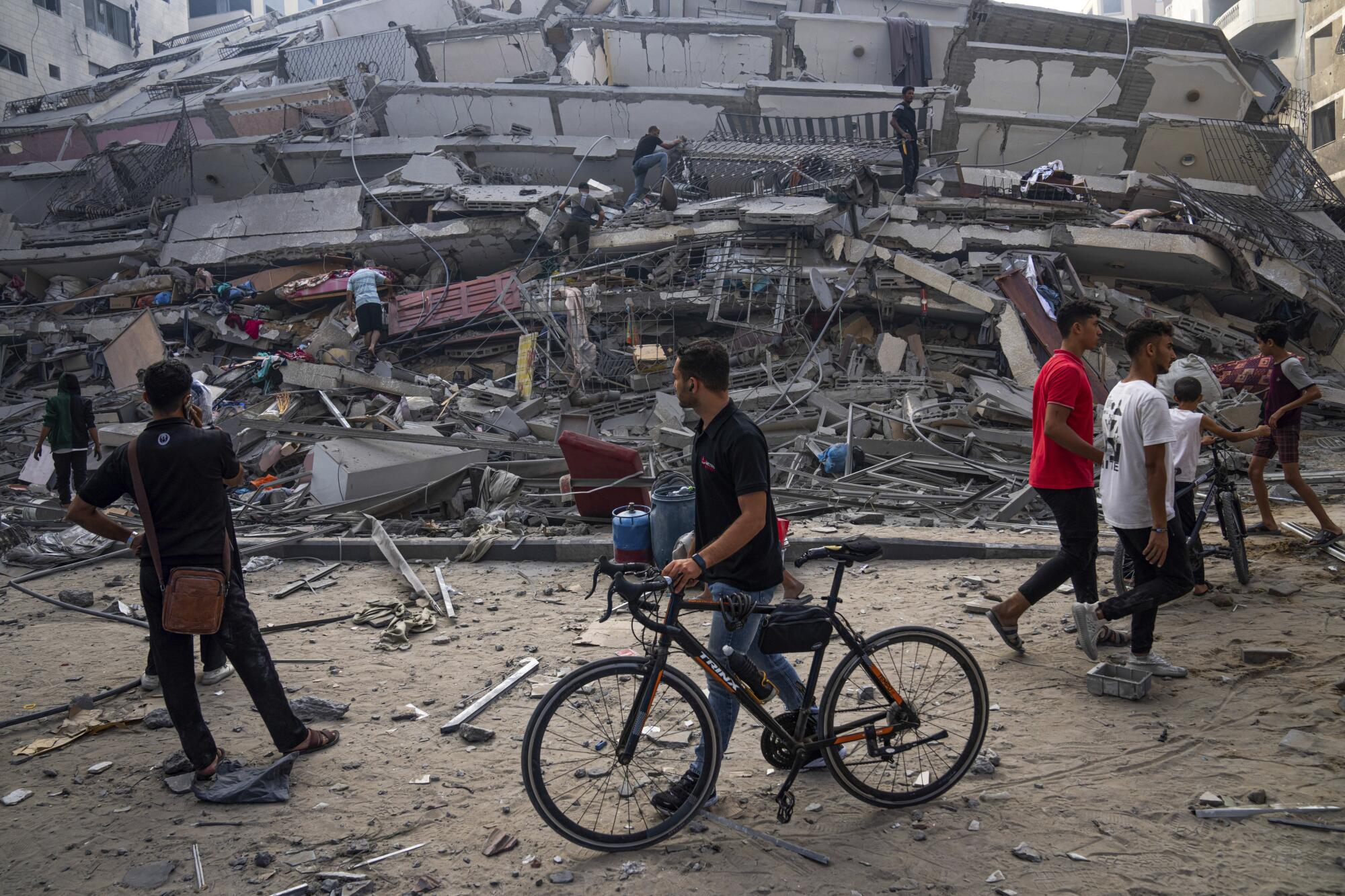
The scale and tactics of Saturday’s incursion from Gaza, which saw Hamas fighters pour across the border by land, sea and air after a sustained rocket barrage, dumbfounded the Israeli government. Questions were immediately raised as to how the Israeli security establishment, with its vaunted network of informants and intelligence-gathering operations in the Palestinian territories, could have failed to detect plans of such a sophisticated attack on so many fronts.
U.S. officials said senior Hamas and Hezbollah officials traveled in recent weeks to Iran for meetings with top Iranian leaders, suggesting they conspired to launch attacks on Israel, although the timing was unclear.
The lapse was particularly embarrassing for Netanyahu, who has styled himself as a strong, security-minded leader and who has moved further right with tough-talking rhetoric against Palestinians to appease his ultranationalist governing partners. Israel’s longest-serving prime minister had also been working toward normalizing ties with Saudi Arabia after signing accords with other Arab states, such as Bahrain and the United Arab Emirates.
His vow to obliterate Hamas in Gaza, which will have the unavoidable effect of further immiserating the lives of the 2 million people crammed into the Mediterranean enclave, will complicate those diplomatic moves.
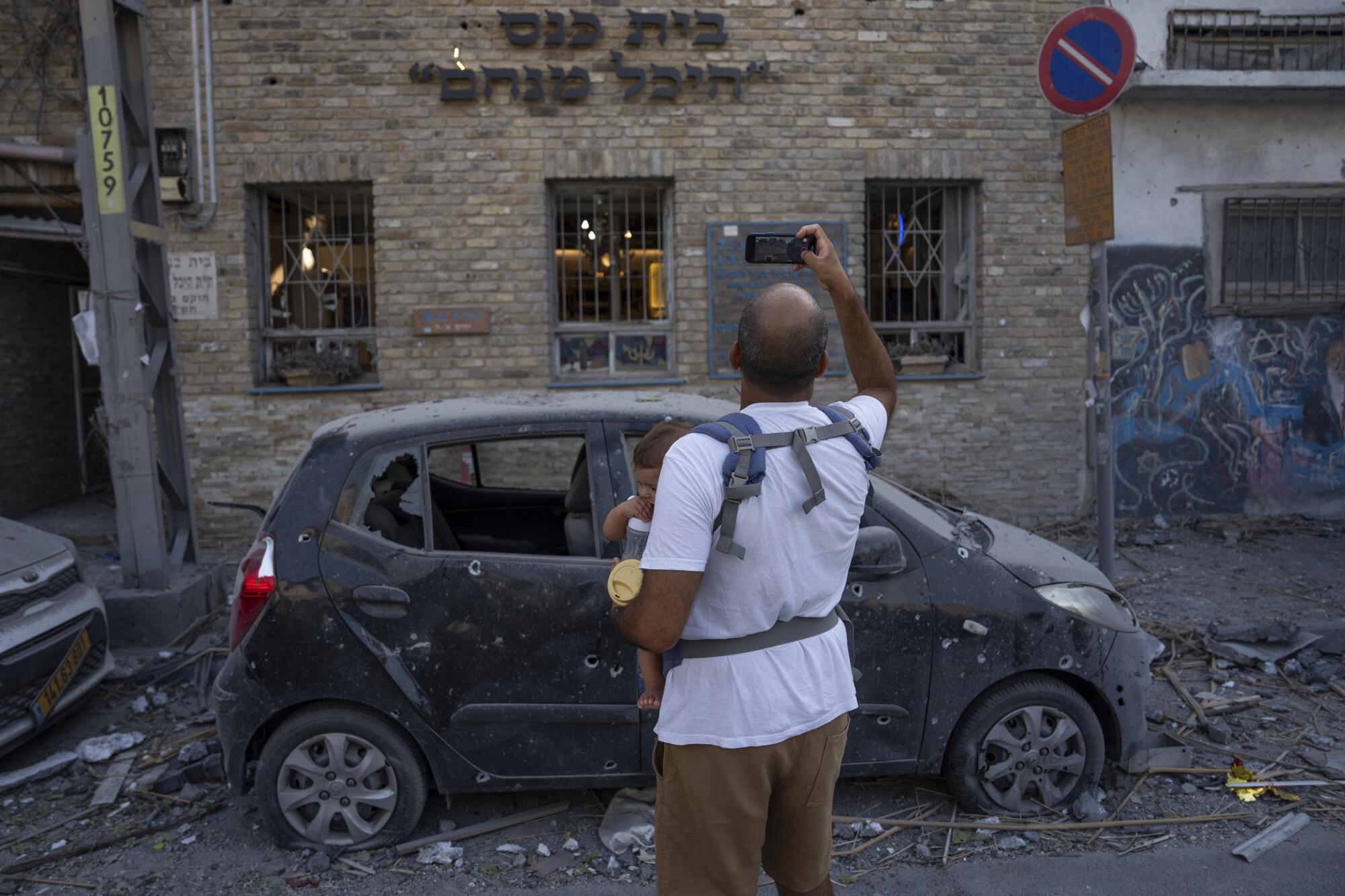
“All the places that Hamas hides in, operates in, we will turn them into ruins,” Netanyahu said Saturday. He warned Gaza’s residents to “get out of there now,” in advance of Israel’s retaliation, even though they, in effect, have no way to do so, since the territory has been under blockade by Israel and Egypt for years.
The Security Cabinet’s declaration of war was largely symbolic, said Yohanan Plesner, the head of the Israel Democracy Institute, a local think tank. But it “demonstrates that the government thinks we are entering a more lengthy, intense and significant period of war.”
Israel has carried out major military campaigns over the last four decades in Lebanon and Gaza that it portrayed as wars, but without a formal declaration.
The Security Cabinet also approved undefined “significant military steps.”
Israel hit more than 800 targets in Gaza so far, its military said, including airstrikes that leveled much of the town of Beit Hanoun in the enclave’s northeast corner.
Warplanes fired tons of explosives on 120 targets in the town, Israeli Rear Adm. Daniel Hagari told reporters, saying Hamas was using it as a staging ground for attacks. There was no immediate word on casualties, and most of the community’s population of tens of thousands of people likely fled before the bombardment.
“We will continue to attack in this way, with this force, continuously, on all gathering [places] and routes” used by Hamas, Hagari said.
President Biden has condemned Hamas’ assault, declaring that “the United States stands with Israel. We will not ever fail to have her back.” British Prime Minister Rishi Sunak also pledged “full solidarity” with Israel.
This is the second time that Israel and Hamas have engaged in full-scale hostilities in 2½ years. The last war — their fourth — lasted nearly two weeks in May 2021 before the two sides agreed to an internationally brokered cease-fire.
But rather than dissipating, the animating forces of that conflict have persisted, with tensions at a constant simmer. Many Palestinians lambaste Israel for its tightened control over sites in Jerusalem that are holy to Muslims and Christians as well as to Jews, and have denounced the far-right government’s determination to build more Israeli settlements in the occupied West Bank, which they see as colonization and ethnic cleansing and which most of the international community considers illegal.
Breaking News
Get breaking news, investigations, analysis and more signature journalism from the Los Angeles Times in your inbox.
You may occasionally receive promotional content from the Los Angeles Times.
Constant military raids in the West Bank, which Israel says are necessary to thwart or punish deadly attacks on settlers and other Israelis, have resulted in the deaths of dozens of Palestinians. Although Israel says most of those killed have been militants, bystanders have also been among the casualties.
Last month, Save the Children said Israeli forces had killed at least 38 children since the beginning of 2023 until September, making it the deadliest year since records began; at least six Israeli children were also killed in the same time period, the group said.
On Sunday, six Palestinians were killed in clashes with Israeli soldiers around the West Bank.
The sophisticated assault on Israel, when many residents were celebrating a normally joyous holiday, revived painful memories of the coordinated surprise attack by Egypt and Syria half a century ago, in 1973, when Israelis were observing Yom Kippur, the holiest day on the Jewish calendar. That conflict lasted for 20 days.
Bulos reported from Amman, Chu from London and Wilkinson from Washington. The Associated Press contributed to this report.
More to Read
Sign up for Essential California
The most important California stories and recommendations in your inbox every morning.
You may occasionally receive promotional content from the Los Angeles Times.

